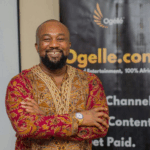
For Osita Oparaugo, building a streaming business in Africa was akin to warfare. The three-time Nigerian founder, best known as the former CEO of Ogelle, a content-sharing platform he launched in 2019, described the battle as one fought on multiple fronts: adoption, funding, and competing with global giants.
“I lost $18 million building Ogelle,” Oparaugo recalled. “Money from my pocket, my partners, family, friends, colleagues, angel investors, we all lost. I have so many stories from that experience.”
The Big Idea: Ogelle
Trained as an investment lawyer in the UK, Oparaugo saw an opportunity to empower African creators by allowing them to produce, share, and monetise content in their local languages. Ogelle was billed as the first African-owned, user-generated content platform with the mission of preserving and elevating African languages.
At its peak, Ogelle attracted actors, musicians, and creators across Africa who valued a platform built for them. But the challenges soon became clear:
- Monetisation barriers: “Africa is not ready for paid streaming services,” Oparaugo admitted. Many target users lacked the economic power to support subscription models.
- Global competition: YouTube actively discouraged dual posting, delisting African creators who tried to use both platforms.
Despite extensive promotion across 23 African countries, Ogelle shut down in April 2024.
Early Life and Legal Career
Born in Owerri, southeastern Nigeria, Oparaugo left for Europe at 17. His initial attempt to study engineering in Germany fell apart after failing the mandatory language test three times. He pivoted, earning a diploma in International Relations at Webster University in the Netherlands, then studied law at the University of Buckingham in the UK before returning home for the Nigerian Law School.
By 2014, he was called to the Bar. Though his father prepared him for the family’s real estate and agriculture businesses, Oparaugo craved bigger challenges. In 2015, he founded Footprint to Africa, advising foreign investors on African opportunities across 14 countries. This gave him a front-row seat to the continent’s economic gaps and sparked his pivot into tech.
Act 1: Ogelle’s Rise and Fall
Launched in 2019, Ogelle was often compared to YouTube but positioned as Africa’s answer to localised content sharing. Creators could tell their stories in their languages while earning from their work.
However, high operating costs, weak local purchasing power, lack of government support, and advertiser preference for foreign platforms undermined the model. Oparaugo summed it up bluntly:
“Building for Africa is hard business. You burn capital twice as fast.”
Act 2: GetBundi
After Ogelle’s closure, Oparaugo shifted its focus to education with GetBundi, an edtech platform offering STEM courses under the West African curriculum and digital skills training in areas such as AI, DevOps, cybersecurity, and robotics.
The company emphasizes practical skills over certificates, even offering courses in Pidgin English to improve accessibility. It also collaborates with Nigeria’s National Information Technology Development Agency (NITDA) to develop the country’s digital literacy framework, aiming for 70% literacy by 2027 under the Digital Literacy for All initiative.
“Everyone says Africa has the numbers, but African youths can never compete globally if they lack the digital skill sets that run modern economies. GetBundi focuses on STEM education, practical digital skill learning for young people, and the recognition of informal learning as a means of equipping African youths for the future. With digital skill courses in Pidgin English and soon other local languages, we prioritize skills over certificates,” Oparaugo said.
Act 3: Doballi
The next step was Doballi, a Dubai-based talent recruitment platform designed to connect African tech professionals with global opportunities. Using AI-driven vetting and benchmarking, Doballi ensures that only the top 5% of talent reach international recruiters, easing the hiring burden for employers.
“We wanted to bridge the gap between African talent and global opportunities,” Oparaugo explained. “GetBundi trains them, Doballi showcases them.”
Lessons and Battle Scars
Ogelle left deep scars, but also lessons. Without local funding, government backing, or sufficient consumer purchasing power, the dream of a locally sustained streaming service faltered. Still, Oparaugo maintained transparency with investors a move that kept two of his earliest backers onboard for future ventures.
“Integrity wins in any business,” he said. “I run my companies like an open book.”
Despite the loss, he sees Ogelle’s failure as an apprenticeship. The platform may even return in a reimagined form:
“We overestimated the market in our first act. In two years, Ogelle is coming back as a different product.”
The Bigger Vision
From Owerri to London, Kigali to Dubai, Oparaugo’s career reflects a cross-border approach to problem-solving. Whether in streaming, education, or recruitment, his ventures share a single mission: enabling African talent to thrive locally and globally.
“Building anything is not a walk in the park,” he said. “If you’re building for Africa, you have to pay the price. But I believe the future is worth it.”